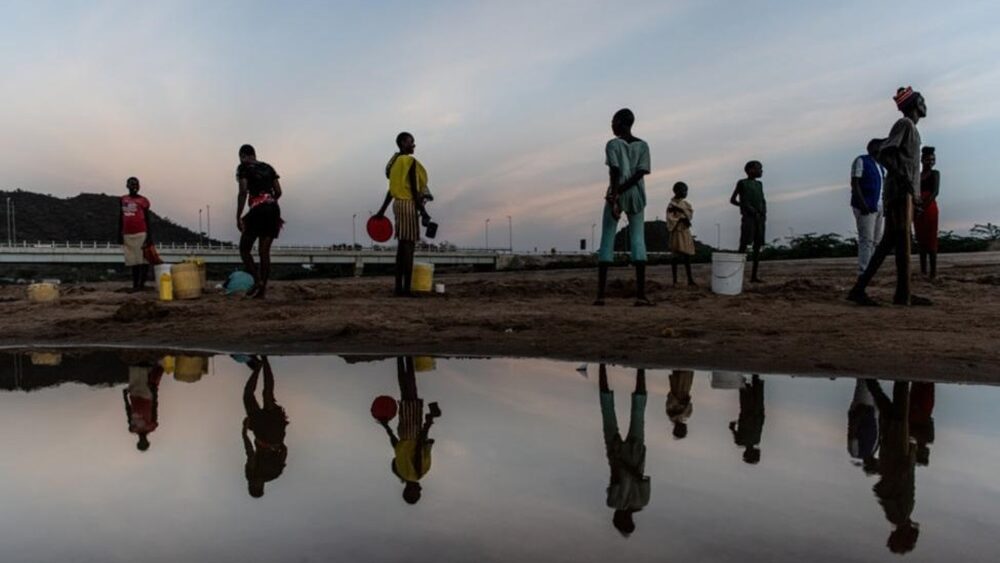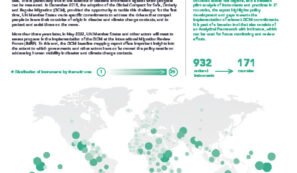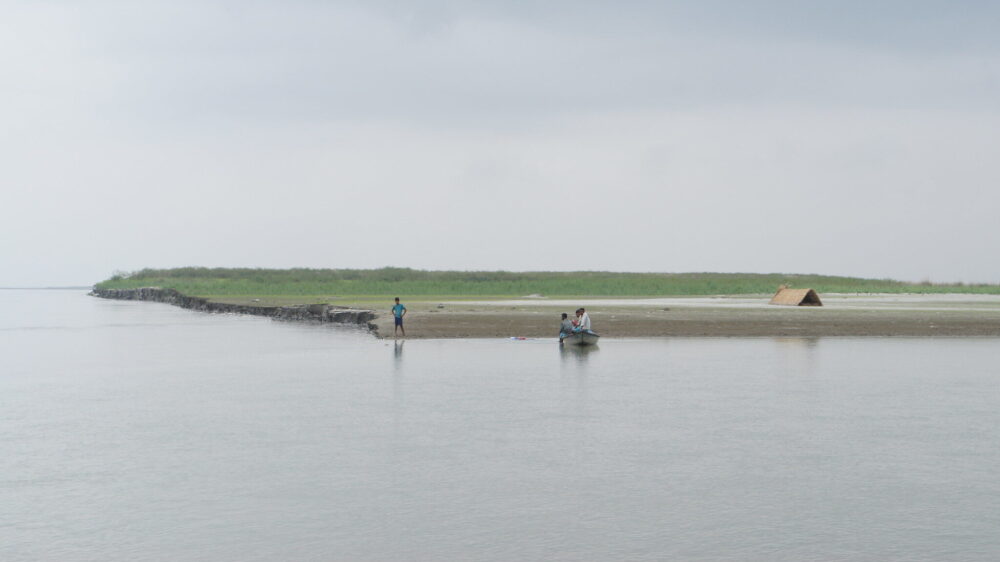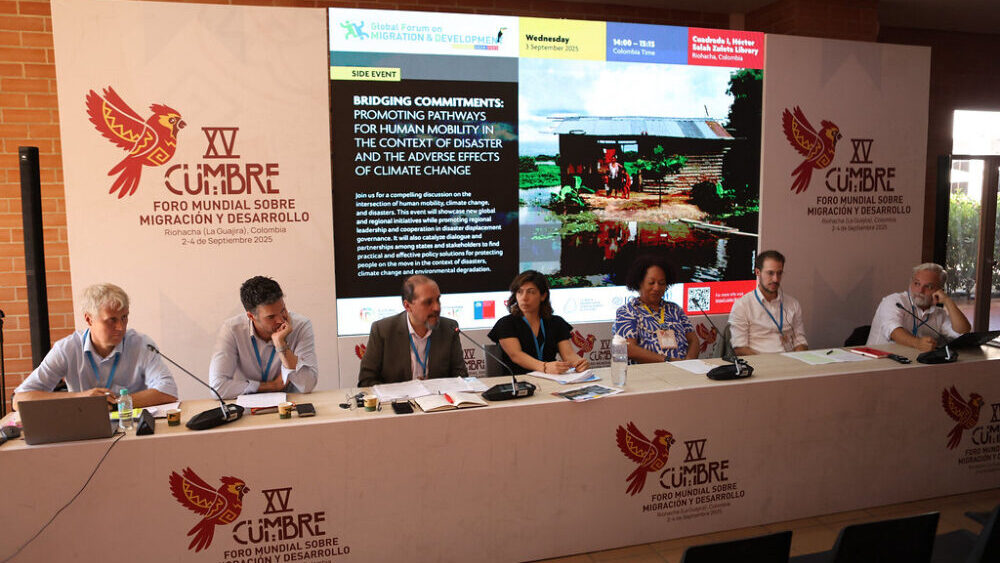Online Talk: Human Mobility in the Context of Disasters, Climate Change and Environmental Degradation

5 June 2024 – the International Organization for Migration (IOM) and the Platform on Disaster Displacement (PDD), on behalf of the UN Network on Migration workstream on Climate Change, the GCM and the Paris Agreement, are organizing a GCM Talk for the Arab Region on Human Mobility in the Context of Disasters and Climate Change. This event aims to inform the GCM Regional Review for the Arab Region, which will take place on 3-4 July 2024.
Background
In December 2018, United Nations Member States adopted the Global Compact for Safe, Orderly and Regular Migration (GCM), a non-binding international agreement calling for a common and comprehensive approach to international migration governance in line with obligations and principles established under international law. Under Objectives 2, 5, 21 and 23, the GCM outlines twelve commitments to address migration and human mobility in the context of disasters, climate change and environmental degradation.
To support and facilitate States’ efforts to implement these commitments, the United Nations Network on Migration (Network) at the global level established the workstream on Climate Change, the GCM and the Paris Agreement, led by IOM, the International Labour Organization and UNFCCC and supported by: ACT Alliance, Alianza Americas, Caritas Internationalis, Church World Service, CMDP, FAO, IFAD, IFRC, ITUC, Norwegian Refugee Council, Ovibashi Karmi Unnayan Program, OHCHR, PacificWIN and Pacific Islands Association of Non-Governmental Organisations, Platform on Disaster Displacement (PDD), PSI, Secours Catholique-Caritas France, Solidarity Center, UNDP, UNHCR, UNICEF, UN MGCY, Unitarian Universalist Service Committee, Water Initiatives, WHO and the Women in Migration Network. As part of the work undertaken by the workstream, the Network launched the “CLIMB Database: Human Mobility in the Context of Disasters, Climate Change and Environmental Degradation Database” in October 2023.
This online database compiles over 1500 policy instruments, including 1348 national policy instruments in 172 countries and 230 bilateral and/or regional policy instruments, that contain provisions of relevance to human mobility in the context of disasters, the adverse effects of climate change, and environmental degradation. As such, the database serves as a valuable resource for policymakers, researchers, practitioners, and other stakeholders working on this topic, both in the context of the GCM as well as other instruments including the Global Compact on Refugees, the UN Framework Convention on Climate Change and the Paris Agreement, and the Sendai Framework for Disaster Risk Reduction.
Regional Context: Arab Region
On 3-4 July 2024, the GCM Regional Review for the Arab Region will take place in Cairo, Egypt, providing Member States and stakeholders an opportunity to assess their progress in implementing the objectives and guiding principles of the GCM. This GCM Talk aims to inform these regional reviews by providing an overview of policy development across the Arab region on addressing human mobility in the context of disasters, the adverse effects of climate change, and environmental degradation.
The Arab region faces a variety of climate-related hazards, ranging from escalating temperatures to shifting rainfall patterns, as well as slow-onset hazards such as increasing sea levels and worsening water scarcity. These trends, intensified by climate change, have far-reaching impacts on the region’s economies, communities’ livelihoods, food and water security, and overall sustainable development. The interplay of demographic growth, urbanization, economic disparities and recessions, conflict, and political instability compounds these challenges, driving increased population movements within the region.
Description of Event
Drawing on the data collated in the CLIMB Database, the GCM Talk will provide an overview of policy development across the Arab region on addressing human mobility in the context of disasters, the adverse effects of climate change and environmental degradation. The discussions will highlight the ways in which Member States can use this data to identify and address policy gaps, and outline opportunities for Member State engagement to advance the implementation of relevant GCM commitments analyzed under the CLIMB Database during the GCM Regional Reviews for the Arab Region.
Objectives
The GCM Talks will aim to:
- Provide a regional overview of policy and legislative developments around governments’ GCM commitments in the context of disasters, climate change, and environmental degradation, highlighting good practices;
- Promote increased knowledge and understanding on the availability of and ways to use the data contained in the CLIMB Database for Member States and other stakeholders;
- Encourage Member States and stakeholders to engage with, contribute to, and further strengthen the accuracy and comprehensiveness of the database; and
- Discuss GCM implementation ahead of the GCM regional reviews for the Arab region.
Guiding Questions
- How have recent policy and legal developments in the region addressed human mobility in the context of disasters, climate change, and environmental degradation?
- What good practices have emerged in implementing relevant GCM commitments in the Arab region? What are key challenges in implementing relevant GCM commitments?
- How can regional cooperation and collaboration be enhanced to better facilitate pathways for regular migration in the context of disasters, climate change and environmental degradation?
- How can the data and insights from the CLIMB Database be used effectively to inform future GCM implementation in the region? What could be concrete next steps?
Format
The GCM Talk will be held online for a duration of 90 minutes. After the event, a summary report will be published to inform and support Member States and stakeholders in their GCM implementation efforts. Interpretation will be available in Arabic, French and English.
Photo credit: IOM








